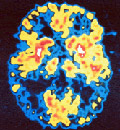
There is some ray of hope for those suffering from Alzheimer's. A recent study has shown that the immune system, which removes beta-amyloid, the main Alzheimer's-causing substance in mice's brain may do the same in the case of humans. This research could pave way for finding a treatment for this disease.
Researchers at the Peninsula College of Medicine and Dentistry, University of Exeter collaborated with the National Institute on Aging in the USA and in Italy and examined the expression levels of thousands of genes in blood samples from nearly 700 people.
Researchers found that the telltale marker of immune system activity against beta-amyloid, a gene called CCR2, recognized as the top marker linked with memory in people.
As a part of the study, researchers used a common clinical measure called the Mini Mental State Examination to measure memory and other cognitive functions.
During study on the mice, it was observed that augmenting the CCR2-activated part of the immune system in the blood stream resulted in improved memory and functioning in mice susceptible to Alzheimer's disease.
"This is a very exciting result. It may be that CCR2-associated immunity could be strengthened in humans to slow Alzheimer's disease, but much more work will be needed to ensure that this approach is safe and effective," Professor David Melzer, lead of the study has been quoted as saying.
Dr Lorna Harries, co-author of the study has said that this discovery would help scientists get a better understanding of such disorders.
"Identification of a key player in the interface between immune function and cognitive ability may help us to gain a better understanding of the disease processes involved in Alzheimer's disease and related disorders," Harries has been quoted as saying.
Here it is worth noting that Alzheimer's disease is the most common form of dementia and around 496,000 people are affected from it in the UK alone.
--with inputs from ANI
|
|


Comments: